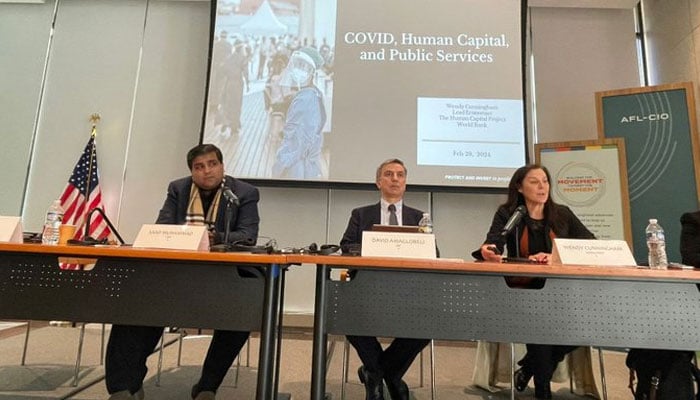Trade leader advocates for pro-worker economic policies
LAHORE : In a recent meeting with the International Monetary Fund (IMF) and the World Bank, Saad Muhammad, a prominent trade union leader, emphasised the critical role of public goods and services in ensuring the well-being of the workforce and contributing to overall economic development.
He fervently raised concerns about the adverse impact of existing tax policies on the lives of common workers. Saad specifically called for a reassessment of taxes on essential commodities such as food items, electricity, and Sui Gas, emphasising the severe repercussions on the average worker's livelihood.
During the discussions, Saad proposed a collaborative approach with the IMF to address the issue of resource wastage, particularly by curbing excessive privileges like providing free electricity, vehicles with protocol, etc., to parliamentarians and government servants.
He argued that focusing on controlling such unnecessary expenditures could alleviate financial burdens on essential services without compromising the well-being of the working class or a common man. Saad unveiled a stark reality during recent engagements with the IMF and World Bank. Sharing copies of the Domestic Household Bill of Pakistan, Saad shed light on the burden placed on consumers through an array of taxes he presented comprehensive data illustrating that more than 10 types of taxes are imposed on consumers in Pakistan through domestic household bills, surpassing the actual cost of electricity. In a compelling move, Saad questioned the fairness of a tax structure that remains uniform for both the impoverished and the elite. In a pointed inquiry, Saad challenged the notion of fairness in a tax system that applies the same rates to both the economically disadvantaged and the elite class.
-
 Pal Reveals Prince William’s ‘disorienting’ Turmoil Over Kate’s Cancer: ‘You Saw In His Eyes & The Way He Held Himself’
Pal Reveals Prince William’s ‘disorienting’ Turmoil Over Kate’s Cancer: ‘You Saw In His Eyes & The Way He Held Himself’ -
 Poll Reveals Majority Of Americans' Views On Bad Bunny
Poll Reveals Majority Of Americans' Views On Bad Bunny -
 Wiz Khalifa Thanks Aimee Aguilar For 'supporting Though Worst' After Dad's Death
Wiz Khalifa Thanks Aimee Aguilar For 'supporting Though Worst' After Dad's Death -
 Man Convicted After DNA Links Him To 20-year-old Rape Case
Man Convicted After DNA Links Him To 20-year-old Rape Case -
 Royal Expert Shares Update In Kate Middleton's Relationship With Princess Eugenie, Beatrice
Royal Expert Shares Update In Kate Middleton's Relationship With Princess Eugenie, Beatrice -
 Andrew Mountbatten-Windsor’s Leaves King Charles With No Choice: ‘Its’ Not Business As Usual’
Andrew Mountbatten-Windsor’s Leaves King Charles With No Choice: ‘Its’ Not Business As Usual’ -
 Dua Lipa Wishes Her 'always And Forever' Callum Turner Happy Birthday
Dua Lipa Wishes Her 'always And Forever' Callum Turner Happy Birthday -
 Police Dressed As Money Heist, Captain America Raid Mobile Theft At Carnival
Police Dressed As Money Heist, Captain America Raid Mobile Theft At Carnival -
 Winter Olympics 2026: Top Contenders Poised To Win Gold In Women’s Figure Skating
Winter Olympics 2026: Top Contenders Poised To Win Gold In Women’s Figure Skating -
 Inside The Moment King Charles Put Prince William In His Place For Speaking Against Andrew
Inside The Moment King Charles Put Prince William In His Place For Speaking Against Andrew -
 Will AI Take Your Job After Graduation? Here’s What Research Really Says
Will AI Take Your Job After Graduation? Here’s What Research Really Says -
 California Cop Accused Of Using Bogus 911 Calls To Reach Ex-partner
California Cop Accused Of Using Bogus 911 Calls To Reach Ex-partner -
 AI Film School Trains Hollywood's Next Generation Of Filmmakers
AI Film School Trains Hollywood's Next Generation Of Filmmakers -
 Royal Expert Claims Meghan Markle Is 'running Out Of Friends'
Royal Expert Claims Meghan Markle Is 'running Out Of Friends' -
 Bruno Mars' Valentine's Day Surprise Labelled 'classy Promo Move'
Bruno Mars' Valentine's Day Surprise Labelled 'classy Promo Move' -
 Ed Sheeran Shares His Trick Of Turning Bad Memories Into Happy Ones
Ed Sheeran Shares His Trick Of Turning Bad Memories Into Happy Ones




